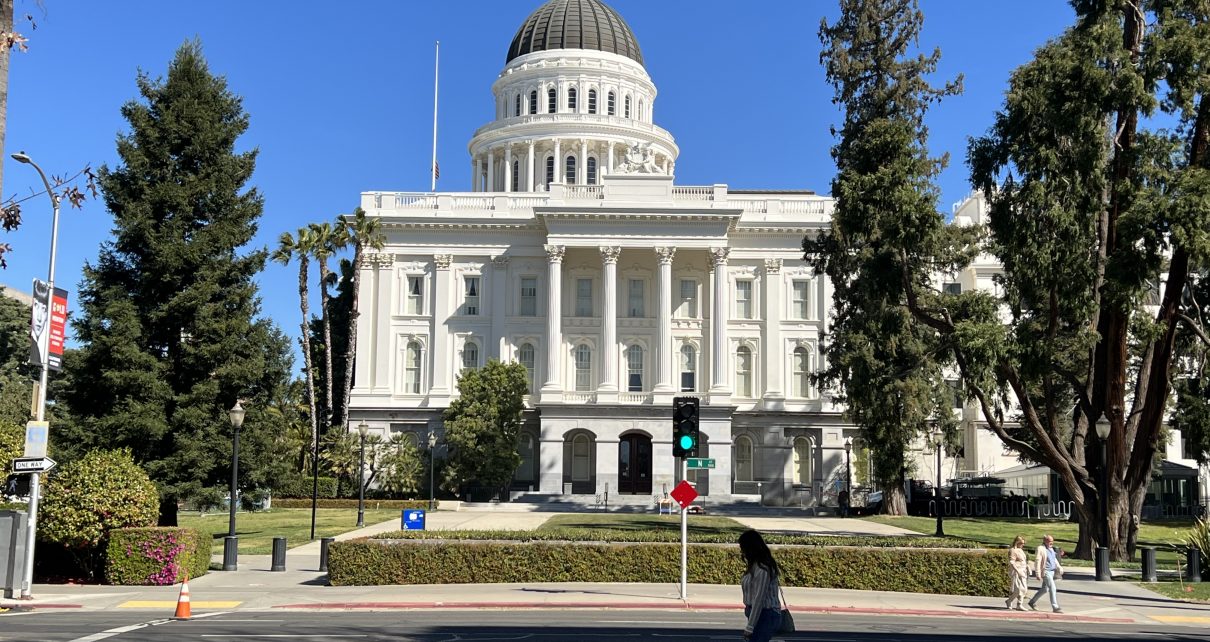
California State Capitol on March 11, 2022. (Photo: Kevin Sanders for California Globe).
Governor Newsom, Legislature Agree To $297.9 Billion 2024-2025 State Budget
Over $30 billion of cuts were proposed but only $16 billion in reductions made the cut.
By Evan Symon, June 24, 2024 12:47 pm
Governor Gavin Newsom, Senate President pro Tempore Mike McGuire (D-Healdsburg) and Assembly Speaker Robert Rivas (D-Salinas) announced this weekend that they have agreed to a state budget of $297.9 billion, of which $211.5 billion comes from the general fund.
According to the 2024-2025 state budget agreement, the Governor, state Senators and Assembly members have agreed to tens of billions of dollars of cuts and other measures to erase a $46.8 billion deficit by the end of the 2025-2026 state budget. However, it should be noted that the Legislative Analyst’s Office (LAO) has given actual state deficit figures of $73 billion and, more recently in May, $55 billion. This means that the state will still be behind by around $8 billion in mid-2026 should all current tax revenue and other financial figures hold. Despite this, Newsom and other lawmakers said that the 2024-2025 budget and the overall budget plan would solve the current budget crisis.
Overall, general fund spending continued to be slashed. Only $211.5 billion of spending is to come from the general fund in 2024-2025, as compared to $225.9 billion in 2023-2024 and $234.6 billion in 2022-2023. Overall, compared to last year, the budget was also slashed, going from $310 billion in 2023-2024 to $297.9 billion for 2024-2025.
As the Globe noted over the weekend, the budget is going up in many areas, including $12 million going to fund reparations bills. The minimum Prop 98 guarantee, which means $115.3 billion going towards K-12 schools and community colleges, is also intact. As are Medi-Cal guarantees, $1 billion in one-time homeless housing assistance funding, and keeping in tact the 2024 Supplemental Security Income/State Supplemental Payment (SSI/SSP) base
grant increases, which includes the 3.2-percent federal SSI cost-of-living adjustment and the 9.2-percent SSP increase. So where are the final cuts coming from after months of back and forth between Newsom and the Legislature?
The initial proposed budget of $330 billion had been slashed in January by Newsom to around $291 billion, with state budget reserves taking much of the weight with $13 billion and budget cuts only coming to $8.5 billion. Overall, over $30 billion of reductions were proposed. But in the 2024-2025 budget agreement this weekend, only $16 billion in reductions made the cut.
Overall, state operations were lowered by 7.95% across most departments. The reduction involves all categories, including personnel, operating costs and contracting for savings of $2.17 billion General Fund. As Newsom had added in his budget revival, a vacant position sweep across all departments would also cut back $1.5 billion, or$762.5 million in the General Fund, in 2024-25 by reducing departments’ budgets for vacant positions. $1.1 billion in affordable housing programs was also axed, along with a handful of other programs only coming to a few hundred million each. This includes a $110 million reduction in the Middle Class Scholarship program.
A $297.9 billion budget
$12.2 billion will also be taken from the state Rainy Day Fund over the next two fiscal years. This includes $5.1 billion in 2024-25 and $7.1 billion in 2025-26 and another $900 million from the Safety Net Reserve in 2024-25. Another $6 billion in savings will come from fund shifts, such as a reduction in CalPERS required employer contributions in 2024-25, saving $1.7 billion.
$5 billion also comes from numerous deferrals and delays. A major California Food Assistance Program expansion was delayed for two years until the 2026-2027 budget.
Despite the state budget deficit still not aligning to LAO figures, the budget slash not being as nearly deep as initially planned, and the Governor and legislative leaders flat out ignoring any possible cuts to social programs, Democratic lawmakers declared the budget a win over the weekend.
“This agreement sets the state on a path for long-term fiscal stability – addressing the current shortfall and strengthening budget resilience down the road,” said the Governor on Saturday. “We’re making sure to preserve programs that serve millions of Californians, including key funding for education, health care, expanded behavioral health services, and combatting homelessness. I’m grateful for the partnership of our legislative leaders in meeting this challenge with balanced solutions that continue to make progress on California’s priorities.”
Senator McGuire added, “Make no mistake: This is a tough budget year, but it also isn’t the budget situation we were originally fearing. Thanks to hard work, tough decisions, and early actions, we’ve been able to shrink the shortfall, protect our progress, and maintain responsible reserves. This balanced budget helps tackle some of our toughest challenges with resources to combat the homelessness crisis, investments in housing, and funding to fight wildfires and retail theft. And we’ve come together to lift up our kids and public schools with record funding, help the most vulnerable in our communities, and address the climate crisis. We owe a big thanks to our budget chairs, Speaker Rivas, Governor Newsom, and to the people of California for entrusting us with this incredible responsibility.”
However, many believed the state could have gone much further, such as additional cuts in transit, education, and other bloated areas.
“The state ignored the real areas it needed cuts in,” Lee Greenman, a California-based accountant who helps city and other regional entities fix budget problems, told the Globe on Wednesday. “They are too focused on social programs and keeping pet programs to impress constituents rather than really fight this deficit. They did everything possible to not make any cuts it seems.”
“But that is what you have to do with a shrinking tax base. You reduce funding, then only raise it when absolutely needed in areas that are needed. Your number of students drop, you don’t approve to build a bunch of new schools.”
“The budget did go down overall, which is good. But there is still a lot of fat to trim. And they obviously don’t want to.”
The new 2024-2025 California state budget is expected to come into effect at the beginning of the fiscal year on July 1st.
- Bill to Require Law Enforcement Disclosure if AI Was Used To Help Write Reports - August 7, 2025
- Gov. Newsom Files FOIA Request To ‘Expose True Cost’ Of L.A. Federal Troop Deployment for Anti-ICE Riots - August 6, 2025
- California Redistricting: How Newsom’s Plan Will Demolish Hard Fought GOP Gains - August 6, 2025





Here’s the Cliffs Notes version and ALL you need to know :
“The state ignored the real areas it needed cuts in,” Lee Greenman, a California-based accountant who helps city and other regional entities fix budget problems, told the Globe on Wednesday. “They are too focused on social programs and keeping pet programs to impress constituents rather than really fight this deficit.”
We have a legislature & Governor who are all FIXATED on “virtue signaling” to their “community organizers” and other special interests (unions, et. al.) and basically giving rank-and-file taxpayers THE FINGER, as was demonstrated last week by their removal of Prop. 47 from the November ballot…
California is in DESPERATE need of a top-to-bottom HOUSECLEANING to GET RID of the government parasites that are literally sucking the economic and quality-of-life right out of California…
Seriously@CriticalD!
At this point I think a Kindergarten class could run this state better!
What nonsense this all is. They would rather fund social programs, reparations to unknown qualifiers and pet projects instead of balancing a budget that should work toward protecting all residents and providing basic infrastructure( fixing pot holes would be a start.)
Typical libtard politicians patting each other on the back for being stupider than last year! Yah!